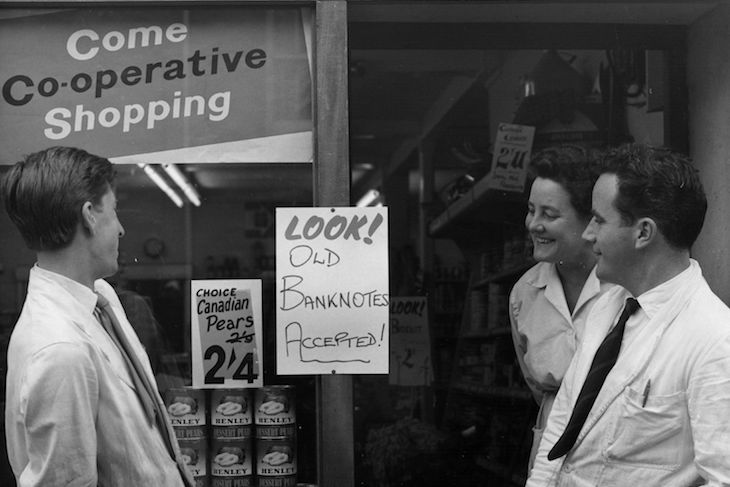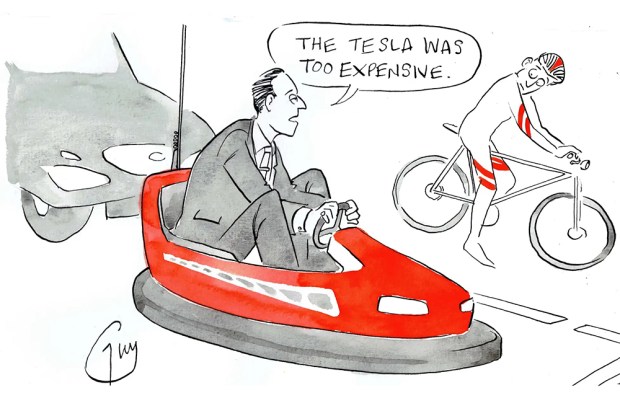When I first visited Canary Wharf in the early 1990s, I was struck by a set of black-and-white posters in the shopping concourse advertising the Co-op Bank’s ethical banking stance: essentially, no lending to arms, tobacco, gambling or oil companies, or to regimes that disrespected human rights. A cynic might have argued that it was all about virtue signalling (before we learned that phrase) in the sense that no landmine manufacturer or brutal Third World dictator had ever been known to pop into a Co-op branch, ask for a loan and be met with a polite refusal and a copy of the policy. But it was a smart exercise in market positioning that won many new customers at the time — and a bold statement to buy poster sites beneath Canary Wharf’s burgeoning towers of finance.
It was the work of Co-op Bank’s then managing director Terry Thomas (later Lord Thomas of Macclesfield), who died this month. His and another death — that of Tessa Tennant, a passionate advocate for socially responsible investment who launched the City’s first ‘green’ unit trust in 1988 — provide food for thought on the intersection of money and moral codes. The environmentalist Tom Burke, who was Tennant’s first boss at the Green Alliance think tank, told me she was ‘the wild child of the movement’ in her early campaigning days but 30 years later the ideas she espoused have gone completely mainstream. No investment institution or pension fund is without its own ethical policy, and no shareholder-owned company operates without awareness of its wider impact on the planet.
Arguably again, there’s an awful lot of PR spin and self-righteous verbiage in this sphere. And you might think the money world has actually become more amoral, not less, over that period because so much wealth has accrued in bad hands, offshore, held through uncaring nominees, untaxed and very often stolen in the first place from citizens of undemocratic regimes. But that makes it more important, not less, that sincere campaigners should keep trying to raise moral awareness. As Tom Burke says: ‘If you want to change the way the world goes round, first you have to change the way the money goes round.’
Waiting for fate
Strange times at Hammerson, the blue-chip property company whose 1.2 million square metres of retail space includes such cathedrals of consumerism as the Bullring in Birmingham, Brent Cross in north London and Bicester Village, the prime destination for every Chinese visitor who sets foot in Britain these days. But the breed of established retailers who are traditional anchor tenants of glossy shopping centres and retail parks are fast becoming an endangered species as the drift online continues, and Hammerson has begun to look like a company that’s waiting for fate to determine its future because its own board no longer knows what to do next.
In April, under pressure from some of its own shareholders, Hammerson abandoned a proposed £3.4 billion takeover of Intu, owner of Manchester’s Trafford Centre. At the same time, a £5 billion takeover approach from Klépierre, a French shopping centre group, was bluntly rejected — leaving Klépierre’s spokesman to regret that ‘the board of Hammerson did not provide any meaningful engagement’. Then we read in Retail Gazette this month that the board had instead ‘flown in management consultancy firm McKinsey & Co to help it understand global retail trends and launch a new strategy’, a move which smacks to many observers of utter desperation.
Meanwhile, Hammerson’s shares, which dropped out of the FTSE 100 in March, trade at a permanent hefty discount to the value of its properties; and US ‘vulture fund’ Elliott Advisors has built up a 5 per cent stake, presumably with the intention of causing trouble. Heads may roll: if I was Hammerson chief executive David Atkins — in post since 2009, paid almost £2 million last year — I’d be feeling distinctly nervous.
Genius or jerk?
Elon Musk, the California-based entrepreneur behind the Tesla electric car, the SpaceX commercial rocket venture and several other wacky start-ups, made a fool of himself with his attempt to intervene in the Thai cave rescue and subsequent Twitter spat, but there’s no doubt he’s an original thinker and a remarkable businessman.
If the futuristic Tesla is a fine feat of technology, what’s more impressive is that the company is not only still in business after 15 years without turning a profit and having lost at least $3.5 billion since 2015, but that its market capitalisation, at $52 billion, is bigger than Ford’s at $42 billion. Tesla built more than 100,000 cars last year compared with 6.6 million by Ford worldwide.
My man in California with a close eye on the tech scene says the deal that really showed Musk’s mettle was his purchase for Tesla in 2010 of the huge former General Motors-Toyota factory at Fremont. GM thought it was worth half a billion but Musk snapped it up, with government support, for just $42 million. ‘So yes, he’s probably an asshole,’ says my man, ‘but a brilliant one.’
Lordly laughter
A postscript on Lord Carrington. When not in government in the 1970s he was a non-executive director of Barclays Bank — seated at the board table next to my father, a grammar school boy who had risen from junior clerk and generally took a dim view of toffs. Impressed though he was by Carrington’s grasp of business issues and sharp contributions to what passed for debate in the deferential boardroom milieu, my father could never get used to the Old Etonian peer’s way of making jokes about all the most serious problems facing the bank in those dire economic days. I once asked Carrington for his own recollection of the same meetings: neatly illustrating the point, he said, ‘Oh yes, I remember Vander Weyer, he was great fun, we used to laugh a lot.’
Got something to add? Join the discussion and comment below.
Get 10 issues for just $10
Subscribe to The Spectator Australia today for the next 10 magazine issues, plus full online access, for just $10.
You might disagree with half of it, but you’ll enjoy reading all of it. Try your first month for free, then just $2 a week for the remainder of your first year.















Comments
Don't miss out
Join the conversation with other Spectator Australia readers. Subscribe to leave a comment.
SUBSCRIBEAlready a subscriber? Log in